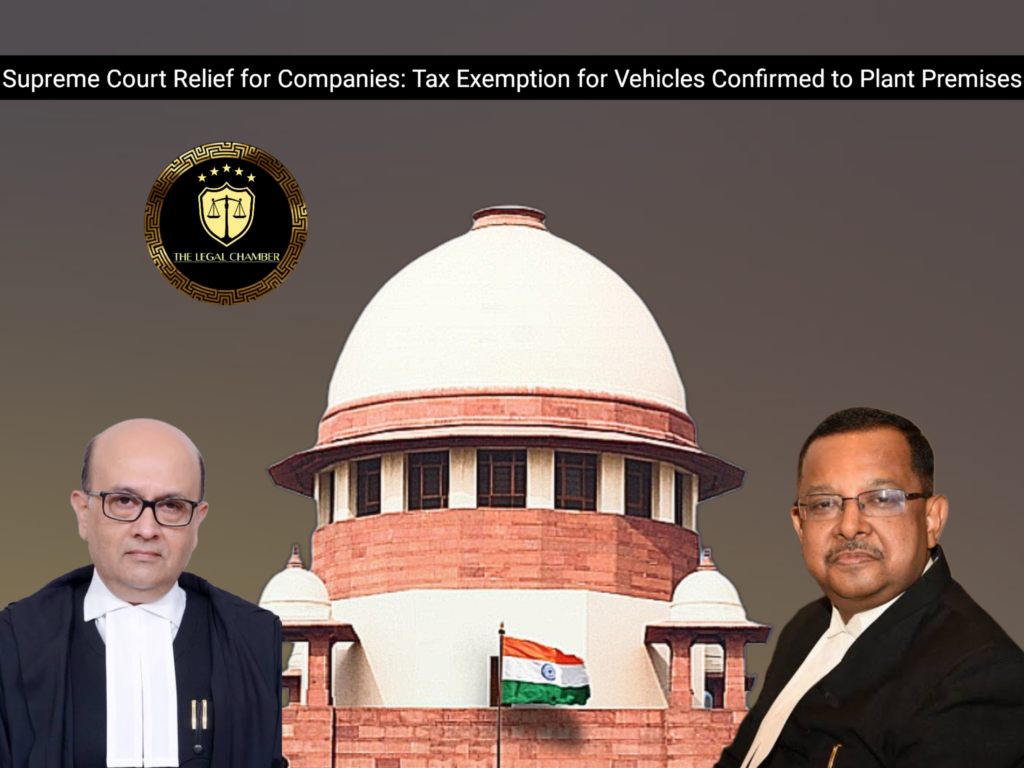
The Supreme Court ruled that motor vehicle tax under the Andhra Pradesh Act is leviable only if a vehicle is used or kept for use in a “public place.” It held that restricted industrial premises, inaccessible to the public, do not constitute a public place. Consequently, vehicles operating exclusively within such enclosed areas are not liable for the tax, and a rule creating a presumption of ‘use’ must be read in harmony with this charging section.
Facts Of The Case:
The appellant, M/s Tarachand Logistic Solutions Limited, was awarded a contract to operate within the enclosed central dispatch yard of the Visakhapatnam Steel Plant (RINL). Pursuant to this, it deployed 36 registered motor vehicles which, from April 1, 2021, were confined solely to operating inside this restricted premises, which was guarded by CISF and not accessible to the public. The appellant sought exemption from paying motor vehicle tax for this period, arguing that as the vehicles were not used or kept for use on any “public place,” they were not liable under the Andhra Pradesh Motor Vehicles Taxation Act, 1963. The transport authorities rejected this claim and raised a tax demand, which the appellant paid under protest. The appellant’s writ petition was initially allowed by a Single Judge of the High Court, who held the yard was not a public place. However, a Division Bench reversed this, relying on a rule that deemed a vehicle to be “kept for use” unless specific intimation was given. The appellant then appealed to the Supreme Court.
Procedural History:
The appellant, after its request for tax exemption was rejected by the Regional Transport Officer, filed a writ petition before the Andhra Pradesh High Court. The High Court, vide order dated 26.04.2022, initially disposed of the petition by directing the authorities to consider the appellant’s representation. Upon reconsideration, the authorities again rejected the claim. The appellant then filed a fresh writ petition challenging this rejection. A learned Single Judge allowed the writ petition, holding the premises was not a public place and directing a refund of the tax. The State respondents preferred a Writ Appeal before a Division Bench of the High Court, which allowed the appeal and set aside the Single Judge’s order, thereby upholding the tax demand. Aggrieved by the Division Bench’s judgment, the appellant filed a Special Leave Petition before the Supreme Court, which granted leave and led to the present civil appeal.
READ ALSO:Supreme Court Rules: Govt Can’t Cancel Ongoing Job Recruitments Midway
Court Observation:
The Supreme Court made several crucial observations, primarily focusing on the interpretation of the charging Section 3 of the A.P. Act, 1963. It held that the taxable event is the use or intention to use a vehicle in a “public place,” a term it defined by relying on the Motor Vehicles Act, 1988, and its precedent in Bolani Ores Ltd. The Court observed that the restricted RINL premises, with controlled access guarded by CISF and no public right of entry, unequivocally did not qualify as a ‘public place’. It further observed that Rule 12A, being a subordinate legislation, could not travel beyond the scope of the parent statute and must be read harmoniously with Section 3; the deemed “kept for use” presumption in the rule must be understood as “kept for use in a public place.” The Court also reiterated that motor vehicle tax is compensatory in nature for using public infrastructure, a benefit not derived when a vehicle is confined to a private, enclosed area.
Final Decision & Judgement:
The Supreme Court allowed the appeal, set aside the impugned judgment of the Division Bench of the High Court, and restored the judgment and order of the learned Single Judge. Consequently, the appellant company is not liable to pay motor vehicle tax for the period its vehicles were used exclusively within the restricted premises of the Visakhapatnam Steel Plant, as it does not constitute a “public place” under the law. The Court directed that the tax amounts paid by the appellant under protest be refunded, concluding that the levy was not authorized by the charging section of the Act for the period in question. There was no order as to costs.
Case Details:
Case Title: M/S. Tarachand Logistic Solutions Limited Versus State of Andhra Pradesh & Ors. Criminal/Civil Appeal No.: Civil Appeal No. 11188 of 2025 Date of Judgement: August 29, 2025 Judges/Justice Name: Justice Manoj Misra and Justice Ujjal Bhuyan
Download The Judgement Here